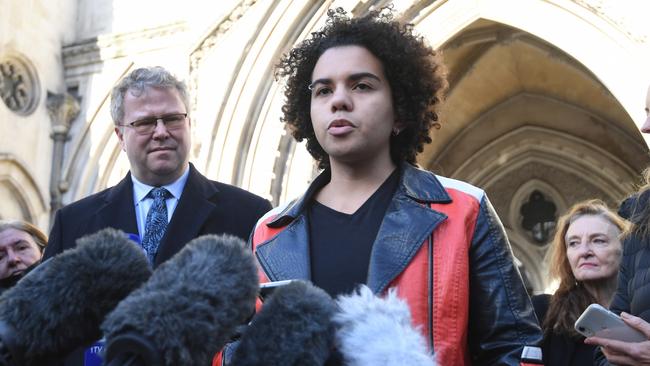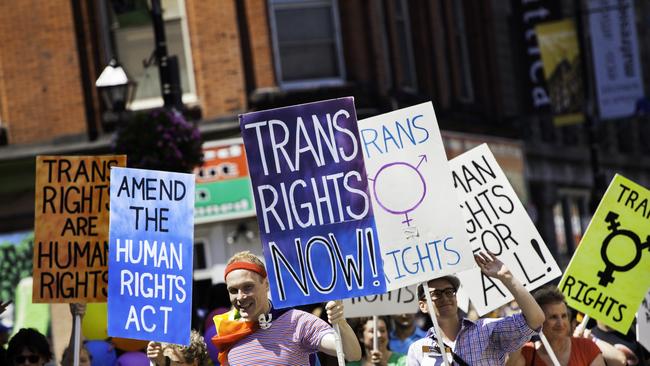Keira Bell, gender transition and the lifelong damage of a puberty blue
The troubling case of Keira Bell has shown how children lack the insight to make decisions on altering gender.

“Apart perhaps from lifesaving treatment, there will be no more profound medical decisions for children than whether to start on this treatment pathway.”
That plain English statement, from the British High Court’s landmark ruling against the NHS Tavistock youth gender clinic, is pivotal to its significance for young people, families, health professionals, hospitals and schools. Australia’s busiest gender clinic, at the Royal Children’s Hospital in Melbourne, has links with the Tavistock, and there is international networking among “gender affirming” specialists who suggest children as young as three are experts in their inner “gender identity”, whereas their biological sex is merely “assigned at birth”.
Puberty-blocker drugs to suppress the natural development of adolescence — to put off “the wrong puberty” for children anywhere from 10-15 who identify as transgender — have been promoted around the world as lifesaving.
The British court heard the same warning that is given to parents anxious about the possible harm of gender medicine: if a child diagnosed with the severe bodily distress of gender dysphoria is denied treatment, the result could be suicide. This alarming advice comes with reassurance: puberty blockers are a “no regrets” option, reducing suicide risk and buying time for child and family to think things through.
And although blockers are the first of a three-stage medical protocol including irreversible cross-sex hormones and surgery — used to mimic the body of the opposite sex — it’s said the child at any time can stop taking these puberty-suppression drugs and resume normal adolescent growth.
But the court has cast serious doubt on the suicide narrative of the gender-affirming clinics and their claim that puberty blockers are a “fully reversible”, stand-alone treatment, rather than an almost inevitable prelude to irreversible, lifelong testosterone or oestrogen drugs.
The 38-page verdict in a challenge brought by Keira Bell, 23, who went from puberty blockers at 16 to a double mastectomy four years later, appears to be the first time that a court has come to grips with the fierce debate about the safety and ethics of the medical treatments approved by gender clinicians for the new, rapidly expanded patient profile of teenagers, most of them born female, who declare themselves trans or non-binary, seek to opt out of puberty and transform their bodies with drugs and, less frequently, surgery.
Bell, one of an emerging international group of “detransitioners”, said she wanted to spare other young people the harmful mistakes that adults had allowed her to make. She fears she has been rendered unable to have her own children.
She did not fit into female gender stereotypes from the age of 4-5, and felt disgusted by her body.

“From the age of 14 she began actively to question her gender identity and started to look at YouTube videos and do research on the internet about gender identity disorder and the transition process,” the judges said.
Bell felt she had “finally found the answer as to why I felt so masculine (and) uncomfortable with my female body”.
In 2013, she began puberty blockers and was warned about the risk to her fertility but at the time she was “not thinking about children” and “her priority was to move on to testosterone”.
She told the court her doubts about the wisdom of medicalised gender change were triggered by “really noticing how physically different I am to men as a biological female, despite having testosterone running through my body. There were also a lot of experiences I could not relate to when having conversations with men, due to being biologically female and socialised in society as a girl”.
“I started to realise the vision I had as a teenager of becoming male was strictly a fantasy. My biological make-up was still female … no matter how much testosterone was in my system … I started to just see a woman with a beard, which is what I was. I felt like a fraud and I began to feel more lost, isolated and confused than I did when I was pre-transition,” Bell said.
The court also heard stories of young people very happy with the care provided by the Tavistock, whose director, Polly Carmichael, said her “clinicians make it very clear to children and young people that there are both known and unknown risks associated with (blockers)”. The Tavistock will seek to appeal the adverse ruling.
“There was no investigation into why I was having those feelings."
— BBC Newsnight (@BBCNewsnight) December 1, 2020
Keira Bell, who was prescribed puberty blockers aged 16, talks to @maitlis about having been referred to the Tavistock Centre, which runs the UK's only gender-identity development service
#Newsnight pic.twitter.com/IHSxi5bpZ2
In its detail, analysis and cautious approach to informed consent, the British judgment contrasts with a line of cases in Australia’s Family Court involving RCH and celebrated by human rights lawyers as removing discriminatory barriers to medical treatment for trans youth, whose autonomy must be upheld. The pinnacle of this law reform campaign was the 2017 re Kelvin case, giving minors the green light to approve their own cross-sex hormones as long as there is no parental dispute over treatment.
Former Family Court chief justice Diana Bryant said the UK ruling “would be relevant in the event of a challenge to overturn the re Kelvin ruling”.
Queensland University dean of law Patrick Parkinson, who advised Bell’s legal team on relevant Australian law, said the English court was “far and away better informed” than the Family Court on the scientific research.
“Australian courts have said that a 15-year-old girl could give an informed consent to a double mastectomy (while) the English court has said a 15-year-old probably doesn’t have the capacity even to give consent to puberty blockers, let alone hormone treatment and irreversible surgery,” he said, speaking in a personal capacity.
Parkinson said the British court’s view that trans hormonal treatment was “experimental” had serious implications for medical practitioners and hospital ethics boards in Australia.
A landmark judgment in the High Court today which will have reverberations around the world. A fantastic win for #KeiraBell, a historic day. https://t.co/B3uUScktTV
— TransgenderTrend (@Transgendertrd) December 1, 2020
The National Association of Practising Psychiatrists, led by Gold Coast clinician Philip Morris, has launched a position statement on treating under-age gender dysphoria that urges thorough assessment, and psychotherapy as “a first-line treatment”, before any talk of medical intervention.
“The (NAPP) approach recognises that (gender dysphoria) can often be a manifestation of complex pre-existing family, social, psychological or psychiatric conditions,” the statement says. It cites evidence that trans hormonal drug treatment “can cause significant adverse effects on physical, cognitive, reproductive and psychosexual development”.
Lawyers say the British ruling will be invoked in a potential Australian test case following the removal of a teenager by child protection authorities because the parents did not “affirm” the child’s trans identity and opposed testosterone drugs as risky.
In the Tavistock case, the judges heard evidence from competing experts and concluded it may be quite unrealistic to expect young people with immature brains to comprehend what is at stake when puberty blocking appears to be a momentous intervention with little evidence of benefit. In the UK, court approval will become necessary for patients under 16, and clinicians are urged to consider the need for judicial oversight even before hormonal treatment of those aged 16 and 17.
“The clinical interventions involve significant, long-term and, in part, potentially irreversible long-term physical, and psychological consequences for young persons,” the British High Court judgment says. “The treatment involved is truly life changing, going as it does to the very heart of an individual’s identity. At present, it is right to call the treatment experimental or innovative in the sense that there are currently limited studies/evidence of the efficacy or long-term effects of the treatment.”
The court noted how unusual it was to resort to invasive medical treatment for gender dysphoria, a condition with “no direct physical manifestation”. Called “gender identity disorder” only seven years ago, this condition is listed in the diagnostic manual of psychiatry, the DSM, but it has an ambiguous status, with some clinicians saying the language used should be reworded again to further “depathologise” it, and some trans activists insisting publicly funded surgery should be available on demand without any diagnosis at all.
There are reports of teens being coached via social media on what to say in the consulting room in order to get the diagnosis that unlocks hormonal drugs.
The UK High Court rules that #PubertyBlockers for normally-timed puberty are experimental and that young gender-dysphoric people (under 16) are unlikely to be able to provide meaningful informed consent.
— SEGM (@SEGMtweets) December 4, 2020
Read SEGM's full statement below:https://t.co/F3arxHQo7t
#KeiraBell
/1
The court made a series of damning findings about the Tavistock over a “surprising” lack of basic data and investigation into what was happening with patients, including a suspected disproportionate number with autism; failure to publish full results of a 2011 puberty-blocker study lacking a control group for rigour; and an unrealistic attitude to how children can reach informed consent.
On the puzzling global shift whereby bodily distress once typically found in a very small number of preschool boys now affects large numbers of teenage girls, the Tavistock “did not put forward any clinical explanation as to why there had been this significant change in the patient group over a relatively short time”.
In 2011, the split was roughly 50-50 between boys and girls but 76 per cent of referrals last year were born female, and that proportion appears similar in Australia, based on limited data. Patient numbers at the Tavistock rose from 97 in 2009 to 2519 in 2018.
A new bestseller called Irreversible Damage: The Transgender Craze Seducing Our Daughters, by former Wall Street Journal writer Abigail Shrier, argues that teenage girls are especially vulnerable to social contagion online and through school peer groups.
Trans activists attribute the surge in patient numbers to more media coverage of gender identity and treatment options, claim the book is “transphobic” and want it banned. The trans health lobby is also campaigning for global bans on what it calls “conversion therapy” aimed at changing a child’s “gender identity”, with Victoria the latest jurisdiction to bring in a draft criminal law and the threat of prison. But the bill gives the all-clear to counselling for anyone “undergoing a gender transition” — or just thinking about it.
"A global wave of criminal laws against any attempt to change someone’s 'gender identity' may end up putting young people who struggle with same-sex attraction on the path to risky hormone drugs and surgery, warns a new group @LGBAlliance_Aus." https://t.co/QiFeC0mzlt
— Bernard Lane (@Bernard_Lane) November 26, 2020
Melbourne University philosopher, feminist and lesbian Holly Lawford-Smith said: “The Keira Bell verdict establishes that children are unlikely to be competent to consent to puberty blockers, which establishes that an ‘affirmation-only’ approach is the wrong approach where it is likely to involve medicalisation.
“Yet Victoria is heading in the opposite direction, with a new bill about to criminalise any individual who fails to ‘affirm’ or support a child’s claim about her gender identity.”
The RCH gender clinic had 538 child and adolescent patients in September, according to data obtained under FOI law. New referrals rose 1767 per cent between 2012 and 2019, and 45 per cent of a group of chiefly female-born teenagers at the clinic showed autism features on a screening test.
A spokeswoman for RCH said it would “monitor closely developments in the UK”. Its own clinic “undergoes regular and rigorous clinical review and complies with Australian law (and aims) to ensure that trans children and young people continue to receive the highest possible quality care”.
In May, federal Health Minister Greg Hunt referred treatment concerns reported by this newspaper to the Australian Health Ministers’ Advisory Council, asking it to come up with an “evidence-based national framework for the care and treatment of children and young people”.
The Weekend Australian sought comment from the Australian Professional Association for Trans Health, which represents gender clinicians and trans activists, and its president Brisbane GP Fiona Bisshop; the Canberra-based trans lobby group A Gender Agenda, which took part in the re Kelvin test case; the Melbourne-based LGBTIQ Legal Service; and the support group Parents of Gender Diverse Children. None replied.
Readers seeking support and information about suicide prevention can contact Lifeline on 13 11 14



To join the conversation, please log in. Don't have an account? Register
Join the conversation, you are commenting as Logout